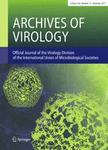版权所有:内蒙古大学图书馆 技术提供:维普资讯• 智图
内蒙古自治区呼和浩特市赛罕区大学西街235号 邮编: 010021

作者机构:Israel Inst Biol Res Dept Infect Dis IL-70450 Ness Ziona Israel Washington Univ Sch Med Dept Mol Biol St Louis MO USA
出 版 物:《ARCHIVES OF VIROLOGY》 (病毒学文献)
年 卷 期:1999年第144卷第6期
页 面:1159-1171页
核心收录:
学科分类:0710[理学-生物学] 1007[医学-药学(可授医学、理学学位)] 100705[医学-微生物与生化药学] 07[理学] 071005[理学-微生物学] 10[医学]
主 题:甲病毒感染/免疫学 中枢神经系统感染/免疫学 中枢神经系统感染/病毒学 免疫 天然 小鼠 近交系 小鼠 SCID Sindbis病毒 种特异性 动物 小鼠
摘 要:Viral infections of the central nervous system (CNS) following peripheral inoculation of Sindbis viruses were studied. The use of viral strains, which vary in their neuroinvasive and neurovirulent properties, and various strains of mice, which differ in immunocompetence, revealed several pathways of viral neuroinvasion in adult mice. A genetic-trait dependent mechanism was exhibited by the neuroinvasive viruses, showing a similar pattern in all mice strains tested. A second mechanism, dependent on a prolonged high viral load, was exhibited by a noninvasive variant in Severe Combined ImmunoDeficient (SCID) mice. The absence of antiviral antibodies in SCID mice allowed the maintenance of a longterm high viremia, leading to a random entry to the CNS and proliferation in brain tissue. An additional pathway for neuroinvasion was induced upon disruption of the blood-brain barrier activity by exogenous reagents and was demonstrated in cases of short lived high viremia of noninvasive viruses.